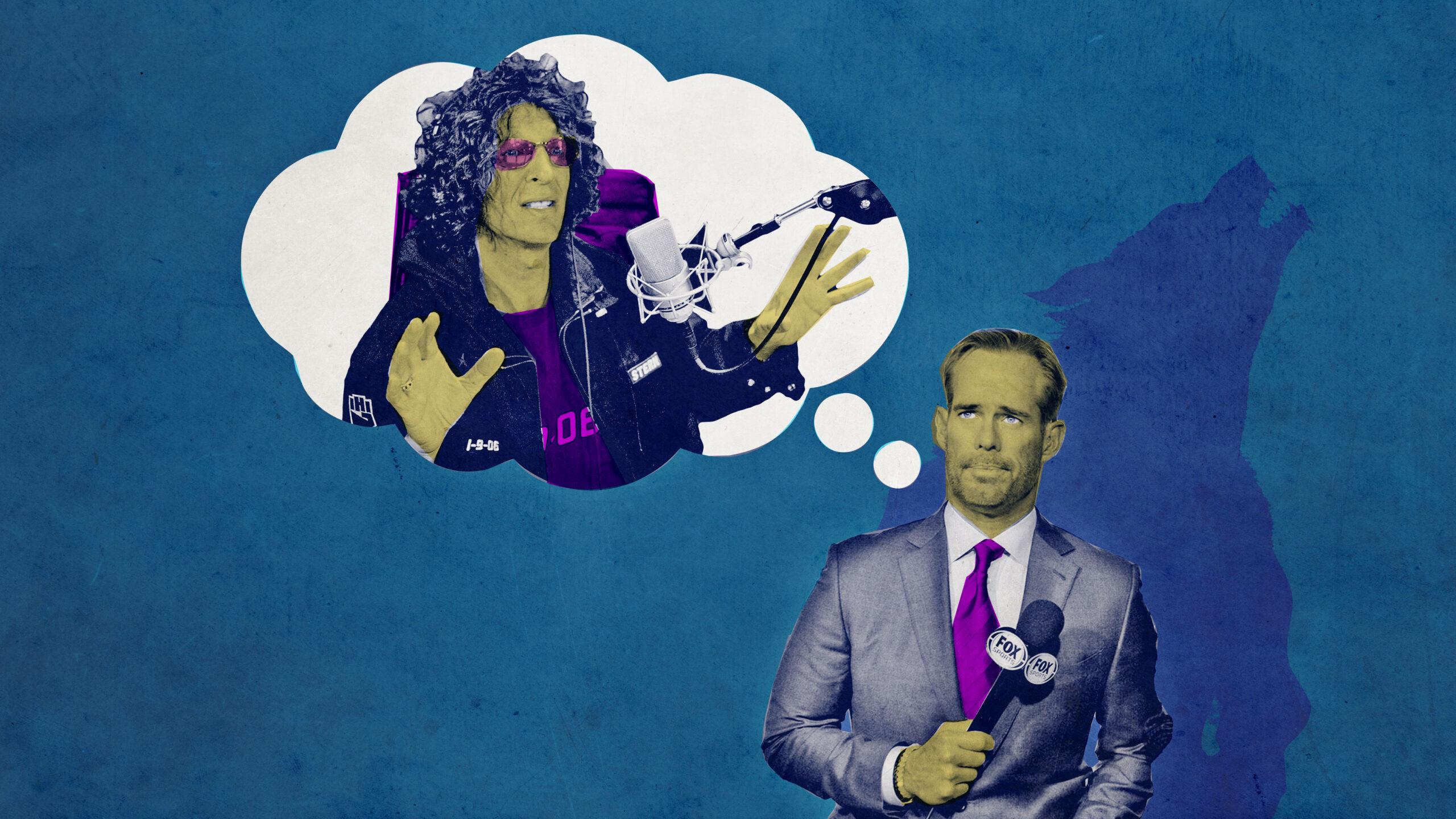Twenty-five years ago, when a Howard Stern prankster wheedled his way onto ABC, it seemed like a miracle that Al Michaels recognized the gag. Here was a network sportscaster who knew what “Baba Booey” meant.
In recent years—and in line with Stern’s newfound “maturity”—an interesting thing happened. We stopped needing pranksters because sportscasters were dropping the Stern show references themselves.
Over on Fox, Joe Buck slyly nodded at Stern during the 2017 American League Championship Series. He planted another reference (“zero point zero”) in the middle of last year’s NFL playoffs. When I asked Buck whether his partners Troy Aikman and John Smoltz got the jokes, he said, “Hell no. Are you kidding me? Nor did either one of my producers.”
Buck is part of a group of sportscasters who are eager to salute Stern. Buck got his first call to be interviewed on the Stern show in January 2017, six days before he announced the Super Bowl. “I was more nervous walking into that studio than I was walking into the booth for the Super Bowl,” he said.
An interview with Stern was bound to be shaggier than one with Sports Business Journal. Stern asked Buck if he’d taken a dump in the greenroom bathroom before the show. Buck admitted he had. Later, Stern regular High Pitch Erik called in and was asked if he’d ever masturbated while thinking about Buck. “Not yet,” Erik replied.
But as soon as Buck had walked into the studio, he noticed a look on Stern’s face that put him at ease. “It was a real nurturing look,” Buck said. “And a smile.” Surrounded by Stern and Robin Quivers and Fred Norris, Buck found that he wanted to unload (figuratively speaking): about his father Jack’s death, about his divorce from his first wife, about his travails with hair plugs.
“I’m not an A-list actor,” Buck said. “I’m not Beetlejuice. And I’m not a porn star. So you go in there and you’re like, Man, I gotta bring it.”
I was more nervous walking into that studio than I was walking into the booth for the Super Bowl.Joe Buck
Stern, Buck continued, “talks about therapy all the time. And I’ve certainly gone to my fair share of therapy appointments. Sitting there talking and being open and honest, after a while you just kind of forget there’s a little, tiny microphone in front of your face and you just start talking to him.”
The second time Buck went on The Howard Stern Show, he brought his wife, Michelle, who’s an ESPN reporter. “We’re sitting there talking about our sex life on the couch,” Buck said. “It was like my worst nightmare and my dream scenario.”
As Stern makes the rounds to publicize his third book, it’s worth studying the sportscasters who make up a tiny yet ubiquitous subset of his fan base. MLB Network’s Robert Flores listens to the Stern show on his way to work and listens to the replay on his way home. When I asked ESPN’s Matthew Berry to try to estimate his Stern fandom, he put it at an eight out of 10. “I couldn’t name all of Robin’s cats,” Berry said. But “I could probably name like three of them.”
A network sportscaster paying homage to Stern is no longer a big deal. Part of this is the way Stern has been mainstreamed, transforming from shock jock to grand old man of Sirius XM. But part of it is the fact that all media is beginning to become a single organism.
Talk to Stern’s sportscaster fans and they’ll tell you they’ve copied his moves behind the microphone. In some cases, they’ve lifted the entire concept of his show. From their heavily formatted world, they envy Stern’s near-complete creative freedom. “I love my job,” said Berry. “I am so, so lucky. But at the end of the day, I work for Disney.” A sportscaster who shouts out Stern is someone who’s listening longingly to his evil twin.
Howard Stern is a pretty lousy sports fan. “Al, what are you doing in town, anyway?” Stern asked Michaels in 1994. Michaels told Stern that he’d been at Giants Stadium the night before, calling a football game on national television.
But the Stern show was so hungry for celebrities to mock-honor that sportscasters were bound to get their turn at bat. In 1992, Stern recruited WNBC’s Len Berman to call a boxing match between Geraldo Rivera and Frank Stallone. They sat ringside, with Berman on play-by-play and Stern doing color. As Berman told me, “The first thing out of his mouth was, ‘Who has the bigger penis, you or Marv Albert?’”
In 2003, Stern acolyte Captain Janks (real name: Tom Cipriano) got on the air on SportsCenter by pretending to be Steve Bartman. “We’ve been had,” said a smiling Dan Patrick, before throwing it to a “Fact or Fiction” segment. When Flores was a SportsCenter host, he once dropped the “l” when he tried to say “shot clock.” Flores flipped on Stern and heard his gaffe being replayed on the air. “If I had to suffer through that embarrassment, the silver lining is that I made it, kind of, on The Howard Stern Show,” he said.
In 2006, Stern hired Scott Ferrall, a gravelly voiced sports radio host, to hold down the late shift on his Sirius XM channel. Ferrall, who now works for CBS Sports Radio, thinks that being tapped by Stern was the greatest honor of his career. “You know what it was like?” he said last week. “It was like a radio orgasm for me for seven years.”
We’re sitting there talking about our sex life on the couch. It was like my worst nightmare and my dream scenario.Joe Buck
While sportscasters were listening to him, Stern’s image was changing. Initially, he was a fringe player who whined about his lack of mainstream acceptance. In his “King of All Media” phase, Stern whined about his lack of mainstream acceptance while David Remnick profiled him in The New Yorker. These days, on satellite radio, Stern has entered a Carson-esque (he works three days a week), semi-PC, somewhat regal period where he sends flowers to his old nemesis Kathie Lee Gifford.
There’s no longer such a thing as a secret Howard Stern fan. In 2014, Patrick, once a victim of a Captain Janks, performed onstage at Stern’s 60th birthday party. Matthew Berry, who has been a guest on the show six times, scored a table in the back with his wife, Beth.
In Stern’s late period, sportscasters have followed the likes of Madonna and Tina Fey to his couch. Berry got his first call to do the show in 2013 after listening to Stern for more than 25 years. “That’s as nervous as I’ve ever been going in front of a live microphone,” Berry said, sounding a lot like Joe Buck. He entertained Stern with tales of his screenwriting career and only cursed himself for missing a few obvious laugh lines. The second time Berry went on, he followed George Takei.
The latent subject of every Stern interview is the host comparing the interviewee’s success with his own. When Buck went on in 2017, it was clear that he and Stern had reached the mountaintop on opposite tracks. As an up-and-coming announcer, Buck was blessed by Rudy Martzke but got trashed on social media. As a young hellion, Stern won over the future Twitter eggs of America but craved the respect of the mainstream.
The power of the Stern interview is that even an unlikable celebrity seems pretty cool after they’ve submitted to his questions and “said it all.” As Buck told me, “Most of the time, at the end of the interview, I was like, Man, I have a ton of appreciation for that person.” Even though he hasn’t been on in a while, Buck still gets compliments on his Stern interviews all the time. A few weeks ago, someone mentioned them at his kids’ swim lesson.
There aren’t many sports media types (at least outside of Jim Rome) who have their own Wack Pack. But sportscasters listening to Stern have found elements of his show to take as their own.
The Howard Stern Show is radio’s version of the American office. It’s a power struggle between the People in Charge (Stern, Quivers, nominally Norris) and the Backstage Underlings who fail to adequately please them (initially Gary Dell’Abate, but now a few dozen people over the run of the show).
Today, nearly every sports radio show and podcast on planet Earth is also an office drama. They all seize on production mistakes and turn them into segments. They all demand that “every conversation happen on the air.” Backstage personnel have official nicknames (The Danettes, Nephew Kyle), and they double as on-mic characters. “Our show has a camera in the control room!” Flores said of MLB Central.
It’s stunning how much of this generation of sports media has been built in the Stern show’s image. As Berry told me: “When we started [my ESPN podcast], I said, ‘Look, the podcast can’t be nerds talking to nerds. We should do a morning radio show that just happens to be about fantasy sports.’ … I think you’ll see his influences all over how I perform and what we do on the show.”
It was like a radio orgasm for me for seven years.Scott Ferrall
When Stern was climbing through the ranks of morning radio, critics thought of his rebellions in terms of content. How could he say that? In fact, most of Stern’s rebellions were against format. Stern hated the idea that a deejay should “hit the post”—that is, neuter his personality the moment the lyrics of a song kicked in. Stern’s motivation was totally self-interested. The more he talked, the more the audience got interested in him instead of the music. He would become bigger than the genre.
In what he admits is “my own, small way,” Berry did the same thing with fantasy sports. When editors instructed Berry to just tell readers which players to start and sit, Berry insisted on leading his column with a long, semi-indulgent section about his own life. He was betting he could outgrow fantasy sports in the same way Stern did with morning radio.
Sportscasters are interested in Stern’s vampiric celebrity interviews—“his innate ability,” as Ferrall put it, “to suck the life out of someone.” Ferrall added: “Everyone thinks they’re good at doing this. … I always say everyone sucks compared to him, including me.”
When Buck was on Stern’s couch, he was first struck by the fact that Stern actually listened to what he was saying. “I’m sure he had no real idea of who I was,” Buck said. “I’m sure if he looked at any parts of my book it was minimal and he skimmed little pieces of it. He did some prep. And then he went in there and he said, ‘I’m going to get to know this guy.’”
It was the opposite of the experience Buck had with Jay Leno on The Tonight Show. “He wasn’t looking at me,” Buck said. “It was unnerving. I was like, I’m boring the hell out of this guy.”
For a guy who made a fortune describing his insecurities (small penis, etc.), Stern’s celebrity interviews are a flex of self-assuredness. Stern knows he’s nimble enough to roll with a guest rather than mowing through a list of questions. Buck noticed that Stern has a verbal crutch: “In other words …” It’s how Stern processes what the guest has just told him, rephrases it (usually in far blunter terms), and then proceeds to dig deeper.
Stern has the advantage of a giant platform. But so does Jimmy Fallon. What makes Stern different is that he demands that guests give up their secrets. “He’s got power before you even start,” Buck said. “If you go in there guarded, it’s going to be horrible. He’ll eventually wear you down anyway, so you might as well just be honest.” Buck was ready to answer questions about his often uncomfortable relationship with his six half siblings from his father’s first marriage. Or less profoundly: “You make doody and pee right before the game?”
For certain sports media types, Stern is a case study in changing your act. Stern made plenty of racist-misogynistic-homophobic jokes that fell outside his dictum that “we make fun of everybody.” When Michaels went on in ’94, he was treated to a racist impression of Judge Lance Ito.
Everyone thinks they’re good at doing this. … I always say everyone sucks compared to him, including me.Scott Ferrall
“I’d feel really fucking shitty if I hadn’t evolved,” Stern told The Hollywood Reporter last week. “I’d be completely out of step with the times.” Today, Stern is interested in interviewing celebrities; Stern regular Gary the Retard was renamed Gary the Conqueror. You could wonder whether this evolution was motivated as much by commerce as by morality; how many apologies Stern offered for the old, cruel bits; and whether Stern has merely maximized both his bad-boy period and his “respectable” phase. But the public transformation Stern is attempting is common enough. Stern is the famous version of outgrowing your shitposts on the internet.
Finally, sportscasters envy the size of the playing field Stern can run in. Sportscasters are prisoners of formatting. The equivalent of a deejay hitting the post is a football announcer shutting up before the snap of the ball.
On satellite radio, Stern can talk as long as he wants, talk about whatever he wants, and allow himself to get distracted during an ad read for Boll & Branch. “I think he would go nuts trying to conform to the guidelines I have to conform to,” Buck said. “And I’d go crazy if I had the latitude that he has to just be myself.”
It’s a parable right out of Stern’s vision of the American office. A sportscaster can land a network gig, a huge salary. And yet every time he’s instructed to throw it to commercial, he’s reminded that he’s really the Underling, and the Person in Charge is somebody else.


